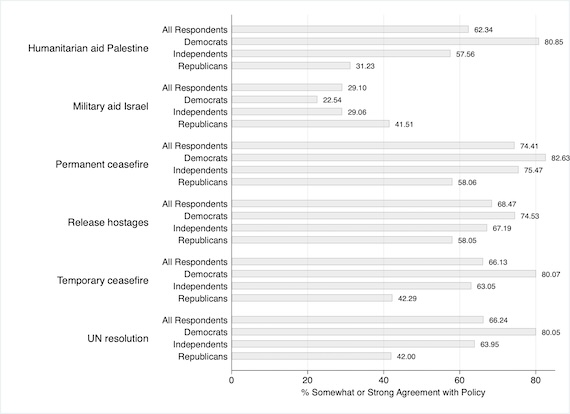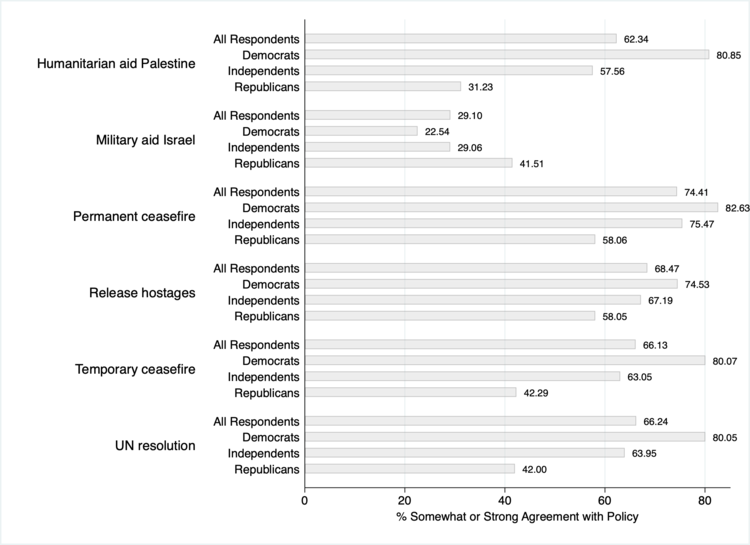East Lansing, MI (Special to Informed Comment; Feature) – For 176 days, the world has borne witness to Israel’s use of disproportionate, and arguably, genocidal force against the people of Gaza. The civilians, children, sons, daughters, sisters, brothers, mothers, fathers, grandparents, and neighbors of Gaza. As of the time of this writing, Al-Jazeera reports that Israel has killed 32,782 people, including more than 13,000 children and 8,400 women. Some 74,980 people have been injured, and more than 8,000 people are reported missing.
Since it was founded, Israel has received the most cumulative funding in the form of U.S. foreign economic and military aid, receiving about $300 billion. And in 2022 alone, the US provided Israel $3.3 billion in military aid. Since October 7, 2023, the Biden administration has asked Congress to provide Israel up to $14 billion more in aid. While this legislation has yet to pass, the United States has since made more than 100 arms transfers to Israel, and almost all have occurred without Congress’ consent or notification. In less than 60 days and between October – December 1, 2023, the United States provided Israel 15,000 bombs and 57,000 artillery shells.
These weapons transfers highlight not only the ways in which the United States is complicit in the military operations that have taken the lives of tens of thousands of Palestinian lives. They also highlight the US policy of unobstructed support, encouragement, and actions aiding and abetting Israel in the slaughter of innocent and helpless people who are being forcibly removed from their homes, bombarded, and starved to death.
Here in the United States, the Muslim, Arab, and MENA background populations have turned sharply against Biden. Despite being a part of Biden’s 2020 winning coalition, they have been vital to the success of the ‘uncommitted campaign’ during the 2024 presidential primaries, which has seen large-scale and public referendums on Biden in key swing states, sending strong signals that Biden has a realistic chance of losing the election in several battleground states in November 2024 if his administration does not shift course with respect to its unwavering support for Israel.
However, most importantly perhaps, for scholars and keen observers of American politics, is that US policy is not just out of step with the preferences of its Muslim, MENA, Arab background citizens, but is in stark and direct opposition to mass public opinion.
A new Gallup poll shows that the majority of Americans disapprove of Israel’s actions. In fact, approval of the military action Israel has taken in Gaza fell from a razor thin 50% in November 2023 to 36% by March 2024. What’s more, Democrats have always opposed Israel’s military action in Gaza; in November 2023, 36% of them approved, and by March 2024, this figure dropped by half to a mere 18%. In this poll, not even a majority of Independents – a constituency we might think that Biden is trying to win over in 2024 – has ever supported Israel’s effort. In November 2023, 47% of them approved, and by March 2024, approval declined to not even one-third of Independents (29%). Only a majority of Republicans has ever approved of Israel’s military actions, though even among this group, there has been a decline in support from 71% in November 2023 to 64% in March 2024.
On March 6, 2024, I fielded a public opinion survey on 1,110 Americans about various policies related to the Israel-Gaza war on the survey platform Prolific. To make the respondent sample more representative of the US population, I applied ACS weights for age, race, and education. These results echo the Gallup findings, but also reveal that Americans want the US to pursue policies that the Biden administration is simply not pursuing. For instance, the survey reveals that Americans across the ideological divide are strongly in favor of a permanent ceasefire and overwhelmingly opposed to sending military aid to Israel – in direct contradiction to the Biden administration’s own actions at the moment.
Respondents in the survey were asked: “Since October 7, 2023, Israel and Hamas have been in a state of active warfare in the Gaza Strip. Have you been actively following the Israel-Hamas war?” I find that Americans are indeed paying attention to this conflict, with over two-thirds (67.81) indicating that they are either somewhat (50.97%) or actively (16.84) following the war.
Survey respondents were also also asked “To what extent do you support the following actions in the war unfolding between Israel and Hamas?: An immediate and temporary ceasefire, An immediate and permanent ceasefire, The US to provide humanitarian aid to Palestine, The US to provide military aid to Israel, The US to vote for the UN ceasefire resolution, and A deal to release Israeli hostages held by Hamas.”
The figure below displays how much all respondents, Democrats, Republicans, and Independents strongly or somewhat agreed with each of these policies.
These findings confirm that the American public is at odds with the administration’s own policies. Not only do they reveal not just how out of step the Biden administration is with its core constituency, Democrats, but also, how out of step it is with most of the American public.
Take the US position on a ceasefire. On January 22, 2024, the White House explicitly indicated that it was opposed to a ceasefire, and by February 20th, it was the sole country to veto the three UN Security Council resolutions for one. With respect to an immediate and temporary versus permanent ceasefire, the results from the Prolific survey indicate that more than nearly three-quarters (74.41%) – either strongly or somewhat support a permanent ceasefire. This number is larger than support for a temporary one (66.13%). Moreover, majorities of each partisan group – and the overwhelming majority of Democrats (82.63%), Republicans (58.06%), and Independents (75.47%) either strongly or somewhat support a permanent ceasefire.
In terms of aid, Americans are also at odds with Biden. The survey reveals large public support for delivering humanitarian aid for Palestine and weak support for military aid for Israel. Nearly two-thirds of Americans in the survey (62.34%) somewhat or strongly support providing humanitarian aid to Palestine, while less than one-third (29.1%) somewhat or strongly support providing military aid to Israel. While 80.85% of Democrats, 31.23% of Republicans, and 57.56% of Independents are in support of sending humanitarian aid to Palestine, no majority of either of the three partisan groups is somewhat or strongly supportive of sending military aid to Israel (e.g., 22.54% of Democrats, 41.51% of Republicans, and 29.06% of Independents). Given that the Biden administration has been incredibly slow at providing humanitarian aid to Palestine and has bypassed Congress over 100 times since the war began to deliver military aid to Israel, the results from this survey demonstrate the many ways that the Biden administration is pursuing policies at odds with the American public’s policy preferences.
Finally, regarding a UN ceasefire resolution and hostage release, there is large-scale public support for both. More than two-thirds of Americans (66.24%) somewhat or strongly support the US voting for a UN ceasefire resolution and somewhat or strongly support a deal to release Israeli hostages held by Hamas (68.47%). Breaking these figures down by partisanship, over 80% of Democrats, about 42% of Republicans, and 63.95% of Independents support a US vote in support of a UN ceasefire resolution. Majorities of all three groups support a deal to release the hostages (e.g., 74.53% of Democrats, 58.05% of Republicans, and 67.19% of Independents). Importantly, the American public does not see hostage release and a ceasefire as mutually exclusive.
These findings beg the question: Why is US policy under a Democratic president in an election year so at odds with the preferences of both Democrats and the American public? The results clearly outline how Americans want US policy to look moving forward. Not only are they paying attention to this conflict, they are most in favor of a permanent ceasefire in Gaza and of a deal to release the hostages. One other finding from this survey is also clear: the key constituents that Biden has to mobilize in the 2024 presidential race (e.g., Democrats and Independents) are very skeptical of his administration’s policies, and especially of sending military aid to Israel.




 © 2025 All Rights Reserved
© 2025 All Rights Reserved